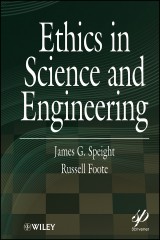Details

Ethics in Science and Engineering
Wiley-Scrivener, Band 61 1. Aufl.
|
93,99 € |
|
| Verlag: | Wiley |
| Format: | |
| Veröffentl.: | 26.09.2011 |
| ISBN/EAN: | 9781118104835 |
| Sprache: | englisch |
| Anzahl Seiten: | 320 |
DRM-geschütztes eBook, Sie benötigen z.B. Adobe Digital Editions und eine Adobe ID zum Lesen.
Beschreibungen
<p><b>The only treatment of ethics from a scientific and engineering perspective</b></p> <p>The pursuit of science and engineering requires freedom of thought and, in the academic sense, unrestricted communication. It is through the professionalism of the members of these disciplines that world knowledge and technology advances. Yet there are continuous reports of unethical behavior in the forms of data manipulation, cheating, and plagiarism at the highest levels. The motivations for this behavior are varied, such as the need to advance one's career or to obtain research funding.</p> <p>This book gives an account of scientific and engineering disciplines and examines the potential for unethical behavior by professionals. Documented examples are presented to show where the matter could have been halted before it became an unethical issue. The authors also look to the future to see what is in store for professionals in science and engineering and how the potential for unethical behavior can be negated.</p>
<p>Preface ix</p> <p><b>1. Explaining Ethics 1</b></p> <p>1.1 Introduction 1</p> <p>1.2 The Impact of Science and Engineering 8</p> <p>1.3 The Framework of Ethics 12</p> <p>1.4 Ethics in Professional Life 19</p> <p>References 24</p> <p><b>2. Scientists and Engineers 27</b></p> <p>2.1 Introduction 27</p> <p>2.2 Definitions 32</p> <p>2.3 Scientific Disciplines 35</p> <p>2.4 Engineering Disciplines 39</p> <p>2.5 Expert Witness 41</p> <p>2.6 Professionalism 43</p> <p>References 50</p> <p><b>3. The Psychology and Philosophy of Ethics 53</b></p> <p>3.1 Introduction 53</p> <p>3.2 Ethical Responsibilities in Research 56</p> <p>3.3 Ethics in Science and Engineering 63</p> <p>3.4 A Phenomenological Theory of Ethics 72</p> <p>3.5 Conflicts of Interest 76</p> <p>References 82</p> <p><b>4. Education of Scientists and Engineers 85</b></p> <p>4.1 Introduction 85</p> <p>4.2 The High School Experience 87</p> <p>4.3 The Baccalaureate Experience 91</p> <p>4.4 The Graduate Degree Experience 102</p> <p>4.5 Postdoctoral Education 106</p> <p>4.6 Morals and Values 108</p> <p>4.7 Evaluating Scientists and Engineers 113</p> <p>4.8 Intellectual Property 114</p> <p>References 119</p> <p><b>5. Scientific and Engineering Societies 123</b></p> <p>5.1 Introduction 123</p> <p>5.2 Scientific Societies 127</p> <p>5.3 Engineering Societies 131</p> <p>5.4 Codes of Ethics and Ethical Standards 134</p> <p>5.5 Promoting Research Integrity 138</p> <p>5.6 The Effectiveness of Society Activities 140</p> <p>5.7 Academic Freedom 148</p> <p>References 153</p> <p><b>6. Codes of Ethics and Ethical Standards 157</b></p> <p>6.1 Introduction 157</p> <p>6.2 Ethics 166</p> <p>6.3 Codes of Ethics 179</p> <p>6.4 The Premise Behind Codes of Ethics 184</p> <p>6.5 Codes of Ethics and Peer Reviews 188</p> <p>References 191</p> <p><b>7. Integrity in Research 195</b></p> <p>7.1 Introduction 195</p> <p>7.2 The Nature and Conduct of Research 205</p> <p>7.3 Collecting Research Data 216</p> <p>7.4 The Controls 226</p> <p>References 231</p> <p><b>8. Publication and Communication 235</b></p> <p>8.1 Introduction 235</p> <p>8.2 The Scientific and Engineering Literature 241</p> <p>8.3 The Journals 242</p> <p>8.4 Data Manipulation for Publication 247</p> <p>8.5 Detecting Falsified Data 248</p> <p>8.6 Peer Reviewers and Their Duties 249</p> <p>8.7 Duties and Responsibilities of a Journal Editor 252</p> <p>References 257</p> <p><b>9. Enforcement of Codes of Ethics 259</b></p> <p>9.1 Introduction 259</p> <p>9.2 Following a Code of Ethics 262</p> <p>9.3 Enforcing a Code of Ethics 264</p> <p>9.4 Reporting Misconduct 274</p> <p>9.5 Published Examples of Unethical Behavior 280</p> <p>References 288</p> <p>Glossary 291</p> <p>Index 301</p>
<p>“Overall, Speight and Foote present a wide-ranging discussion of ethics from a theoretical and applied perspective making Ethics in Science and Engineering a valuable reference book.” (<i>Journal of Chemical Education</i>, 30 November 2012)</p>
<b>James G. Speight</b> PhD, DSc is a senior fuel and environmental consultant and Visiting Professor at the University of Trinidad and Tobago. He is recognized internationally as an expert in the characterization, properties, and processing of conventional fuels, synthetic fuels, and biofuels. He has more than 40 years of experience in the process industries, is the author of numerous books and papers, is the senior editor of three journals, and has won numerous awards and distinctions. <p><b>Russell Foote</b> earned his PhD in Sociology of Education in 2002 at The University of the West Indies. He has accumulated a range of teachingexperiences at the primary, secondary and tertiary education levels, in addition to administrative, research and community service. He also has publications that are used at every academic level.</p>
<b>The only treatment of ethics from a scientific and engineering perspective</b> <p>The pursuit of science and engineering requires freedom of thought and, in the academic sense, unrestricted communication. It is through the professionalism of the members of these disciplines that world knowledge and technology advances. Yet there are continuous reports of unethical behavior in the forms of data manipulation, cheating, and plagiarism at the highest levels. The motivations for this behavior are varied, such as the need to advance one's career or to obtain research funding.</p> <p>This book gives an account of scientific and engineering disciplines and examines the potential for unethical behavior by professionals. Documented examples are presented to show where the matter could have been halted before it became an unethical issue. The authors also look to the future to see what is in store for professionals in science and engineering and how the potential for unethical behavior can be negated.</p> <p><b><i>Ethics in Science and Engineering</i>:</b></p> <ul> <li>Summarizes the prevailing positions on ethics in today's academic and industrial environments</li> <li>Examines ethics in the context of engineering and scientific research</li> <li>Focuses on academic ethics with particular reference to higher education</li> <li>Discusses the philosophy of ethics</li> <li>Gives examples of unethical behavior and how it should be corrected</li> </ul>


















